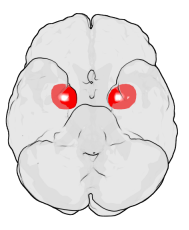
Photo from wikipedia
HighlightsMaternal separation stress reduced both LTP and LTD at the thalamic input to the lateral amygdala.Maternal separation stress impaired LTP and enhanced LTD at the cortical input to the lateral… Click to show full abstract
HighlightsMaternal separation stress reduced both LTP and LTD at the thalamic input to the lateral amygdala.Maternal separation stress impaired LTP and enhanced LTD at the cortical input to the lateral amygdala.Treatment with imipramine restored the extent of the synaptic modification range at the thalamic input.Treatment with imipramine restored the potential for LTD, but not for LTD, at the cortical input.Imipramine‐mediated restoration of synaptic plasticity will have consequences for amygdala‐dependent learning. ABSTRACT Long‐term potentiation (LTP) and long‐term depression (LTD) are two opposite forms of synaptic plasticity at the cortical and thalamic inputs to the lateral amygdala (LA). It has been demonstrated that maternal separation (MS) of rat pups results in alterations in the potential for both pathways to undergo LTP and LTD in adolescence. Imipramine, a prototypic tricyclic antidepressant, has been shown to counteract some detrimental effects of MS on rat behavior, however it is not known whether MS‐induced alterations in the potential for bidirectional synaptic plasticity in the LA could be reversed by imipramine treatment. To this end, rat pups were subjected to MS (3 h/day) on postnatal days (PNDs) 1–21. On each of PNDs 29–42, male rats previously subjected to MS were injected subcutaneously with imipramine (10 mg/kg). Field potentials were recorded ex vivo from slices containing the LA and saturating levels of LTP and LTD were induced. At the thalamic input to the LA, both the maximum LTP and the maximum LTD were reduced in rats subjected to MS when compared to control animals, confirming earlier results. However, these effects were no longer present in rats subjected to MS and later treated with imipramine. At the cortical input in slices prepared from MS‐subjected rats, an impairment of the maximum LTP and an enhancement of the maximum LTD were observed. At the cortical input in rats subjected to MS and receiving imipramine treatment, the level of LTD was comparable to control but imipramine did not restore the potential for LTP at this input. These results demonstrate that imipramine fully reverses the effects of MS in the thalamo‐amygdalar pathway, however, in the cortico‐amygdalar pathway the reversal of the effects of MS by imipramine is partial.
Journal Title: Behavioural Brain Research
Year Published: 2017
Link to full text (if available)
Share on Social Media: Sign Up to like & get
recommendations!